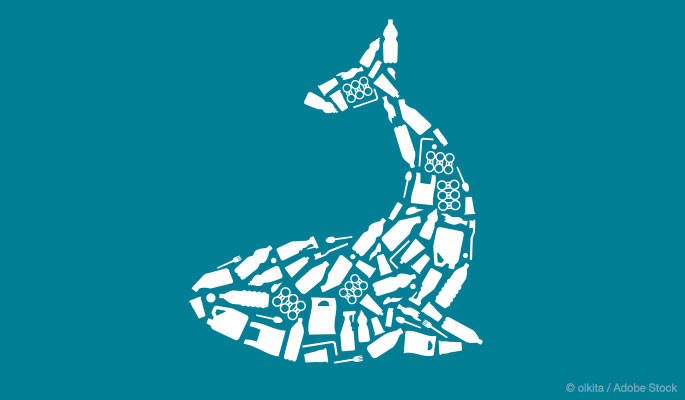
Walk down any street on any given day, and you will find at least one or more of the most common single-use plastics carelessly thrown about. Once on the ground, these items get washed away during rains and find their way into our sewer systems and eventually out to our water resources.
From chip bags to plastic bottle caps, from single-use plastic grocery bags to plastic drinking bottles, and from straws to foam take-out containers, it is obvious that a large portion of the population doesn’t give much thought to our environment or the value of recycling. Compounding this problem is the fact that not all plastics [#3-#7 plastics] are not collected for recycling due to their chemical composition and the cost of recycling them.
According to the UN Environment Services, “…studies suggest that the total economic damage to the world’s marine ecosystem caused by (single-use) plastic [costs us] at least $13 billion every year.”
As depicted above, single-use plastic waste is now responsible for blocking our waterways, thereby magnifying the impact of natural disasters. Furthermore, clogged sewers create the perfect environment in which mosquitoes breed, allowing for infectious diseases to be transmitted by these carriers. And the impact on marine life is devastating; huge numbers of marine animals have died from ingesting single-use plastic bags, mistaking them for food. (1)
Should Single-Use Plastics Be Banned?
This is not a simple Yes or No question. And there is no single solution to address the issues caused by these single-use plastics.
To say Yes, we would then be creating a whole new set of issues by eliminating certain plastic products. Many single-use plastic items have become a necessity in eliminating contamination or transmission of diseases, germs, and bacteria, such as sterile packaging for hospital supplies, IV tubes, syringes, contact lenses, pharmaceuticals, food packaging, bandages, etc.–the list goes on.
To say No would make us irresponsible to our environment and condoning of the current crisis. We would continue to kill off our marine animals, foster pestilence and the spread of diseases such as malaria and watch as beaches and oceans continue becoming dumping grounds for our waste.
We are a single-use consumer world – this will need to change if we are to continue enjoying what Mother Nature has provided us.
Use Less Material
According to a 2016 study by the firm Trucost, using less material provides enormous environmental benefits, resulting in dramatic reductions in energy and resource usage, a reduction in greenhouse gas emissions, and noticeable reduction in waste. The study “…found the environmental cost of using plastics in consumer goods and packaging is nearly four times less than if plastics were replaced with alternative materials.”
Developments and Innovation
In a perfect world, all plastics would be composed of the same materials and recycling would not be an issue – but we are not in a perfect world,
From eliminating microbeads in cosmetic rinse-off products to not using straws and recycling single-use shopping bags, individuals and companies can do their part to keep plastics in use and out of our oceans. Many companies are investing in managing their plastic production in a more circular approach, ensuring that all post-use plastic is responsibly recycled or remade into raw materials for new products.
This includes such processes as
- Chemical recycling converting used plastics back into the recyclable materials
- Compatibilizers, for mixed recycled resins such as the #3-#7 plastics
- Recycling programs for wraps, bags and other flexible packaging, like WRAP and Materials Recovery for the Future
- Programs that allow residents to bag non-recycled plastics to be processed into fuels or manufacturing feedstocks (3)
Some countries and companies have already taken the initiative to reduce single-use plastic waste. In early 2018, China banned imports of post-consumer plastic. Soon after that, Southeast Asia also clamped down on plastic imports. Last year, Editorial Board at the LA Times called for California to phase out all “single-use” plastics.
With the innovations to develop alternatives and reduce the amount of single-use plastic waste that is being introduced, we have witnessed great strides in progress; the plastics we use today can become the plastics we will be using, again and again, and again, in the future. (2)
Should single-use plastic be banned? You decide…
In the meantime, if you are looking to get your company started on recycling and want to put a Green Team together, Waste Wise Products has your recycling bin needs covered! Contact them to discuss how you can turn your organization into one big Green Team and do your part to a smaller carbon footprint.
Article Resources:
1.https://wedocs.unep.org/bitstream/handle/20.500.11822/25496/singleUsePlastic_sustainability.pdf?isAllowed=y&sequence=1 (Reproduction: This publication may be reproduced in whole or in part and in any form for educational or non-profit purposes without special permission from the copyright holder provided acknowledgment of the source is made)
2. https://blog.americanchemistry.com/2018/02/using-plastics-means-less-waste-in-the-first-place/?gclid=CjwKCAiAy-_iBRAaEiwAYhSlAwqw7LlkKsCI6PqcpdPlpq92DElxzJymoSUvwmH9T0pZlrR91i-NtBoCHsQQAvD_BwE
3. https://resource-recycling.com/plastics/2019/02/06/heres-a-domestic-outlet-hungry-for-3-7-plastics/




































































































































 Three Ways to Engage Teams and Clients to Maximize Your Recycling Program Engagement
Three Ways to Engage Teams and Clients to Maximize Your Recycling Program Engagement  How to Integrate Accessibility Into Your Sustainability Planning
How to Integrate Accessibility Into Your Sustainability Planning  Why Park Benches Can Promote Workplace Well-Being
Why Park Benches Can Promote Workplace Well-Being 
